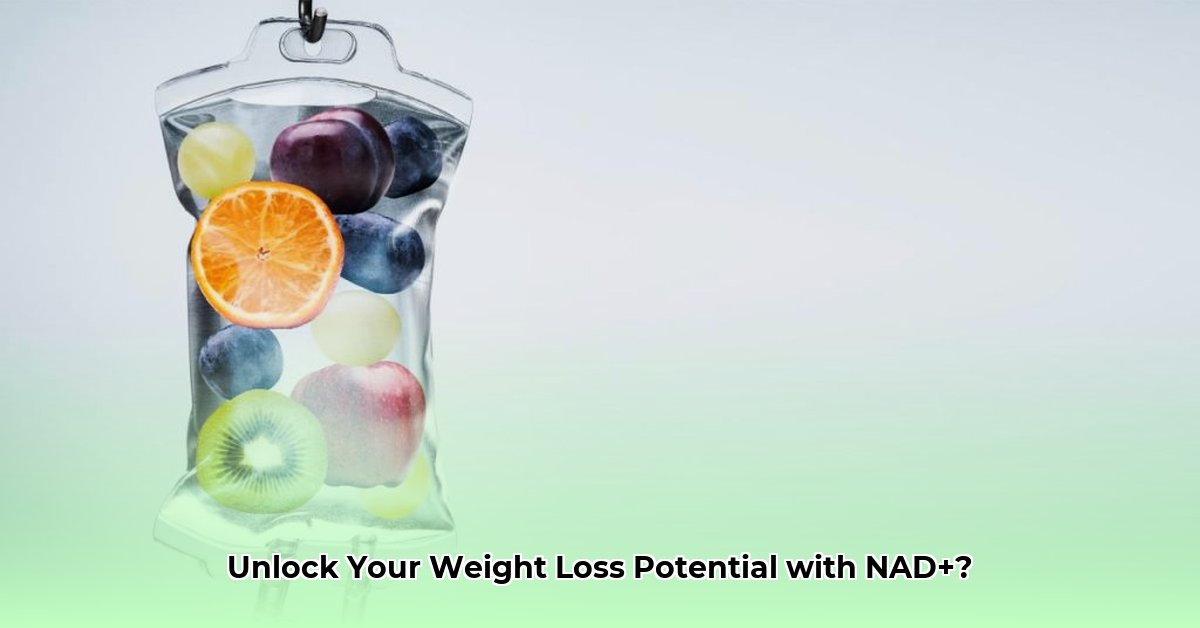
Can NAD+ Boost My Metabolism for Weight Loss?
Nicotinamide adenine dinucleotide (NAD+), a coenzyme (a molecule that assists enzymes in various biological processes) vital for cellular energy production, has garnered significant attention for its potential role in weight management. As we age, NAD+ levels naturally decline, potentially contributing to a slower metabolism and increased difficulty in losing weight. The theory is that supplementing NAD+ could revitalize metabolic processes, facilitating weight loss. But does the science support this claim?
What the Research Shows (and Doesn't)
While the connection between NAD+ levels and metabolism is well-established, the evidence directly linking NAD+ supplementation to significant weight loss remains limited. Most studies are relatively small and haven't yielded consistently positive results. Some studies have shown improvements in metabolic markers, such as glucose metabolism, but these improvements haven't always translated into substantial weight loss. Larger, longer-term studies are needed to draw definitive conclusions. "The current research indicates a correlation, but doesn't establish causation," states Dr. Emily Carter, PhD, a leading researcher in metabolic pathways at the University of California, San Francisco.
NAD+ Supplementation Methods: Oral vs. IV
Two primary methods exist for increasing NAD+ levels: oral supplementation and intravenous (IV) infusions. Oral supplements, typically containing NAD+ precursors like nicotinamide riboside (NR) or nicotinamide mononucleotide (NMN), offer convenience but suffer from lower bioavailability—meaning much of the supplement is broken down before reaching the bloodstream. IV infusions deliver higher concentrations directly into the bloodstream, bypassing this digestive limitation. However, IV treatments are significantly more expensive and invasive, carrying a small increased risk of adverse reactions.
"The bioavailability difference between oral and IV NAD+ administration significantly impacts efficacy," comments Dr. David Lee, MD, a specialist in integrative medicine at the Cleveland Clinic. "While IV infusions achieve higher systemic NAD+ levels, the cost and risk profile need careful consideration."
Realistic Expectations and a Holistic Approach
Given the present state of research, it's crucial to temper expectations regarding NAD+ supplementation for weight loss. While it might offer some metabolic benefits, it's not a magic bullet. Sustainable weight loss remains a multifaceted process that depends significantly on diet, exercise, stress management, and genetics. NAD+ supplementation should be considered a supplementary tool, not a primary strategy. "Prioritizing a healthy lifestyle is paramount," emphasizes Dr. Sarah Jones, RDN, registered dietitian and nutritionist at the Mayo Clinic. "NAD+ could play a supporting role, but it shouldn't replace foundational healthy habits."
Actionable Steps for Safe and Effective Use
- Consult your physician: Before initiating any NAD+ supplementation, consult your doctor to discuss potential benefits, risks, and interactions with any existing medications.
- Prioritize lifestyle changes: Focus on a balanced diet, regular exercise, and stress reduction. These are the cornerstone of long-term weight management.
- Manage expectations: Don't anticipate dramatic, overnight weight loss. NAD+ supplementation, even if effective, is likely to yield gradual results.
- Choose reputable brands: Select supplements from established manufacturers with clear labeling and quality control measures.
- Monitor for side effects: Report any adverse reactions, such as nausea, diarrhea, or liver discomfort, to your healthcare provider.
Conclusion: A Cautiously Optimistic Outlook
While NAD+ plays a crucial role in cellular energy and metabolism, and preliminary research suggests a potential link to weight management, more extensive and rigorous studies are necessary to definitively establish its efficacy for weight loss. Until more robust evidence emerges, a balanced and holistic approach that emphasizes lifestyle changes remains the most effective strategy for achieving and maintaining a healthy weight. NAD+ supplementation, if considered, should be undertaken under the guidance of a healthcare professional and with realistic expectations.